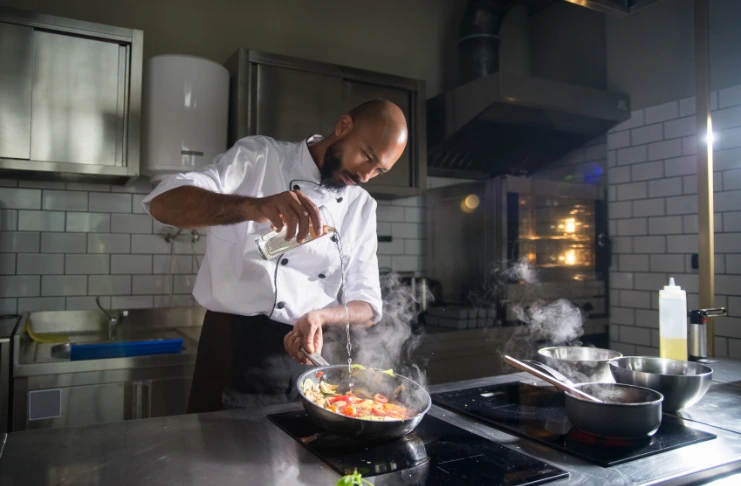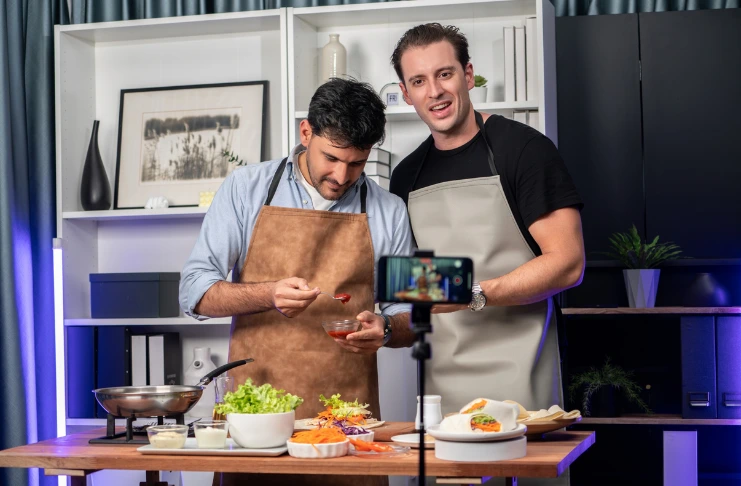
Dubai’s culinary landscape has evolved significantly in recent years, with digital transformation and shifting consumer preferences redefining food consumption, making the business setup more accessible for new entrepreneurs . The rise of online ordering platforms has paved the way for an innovative and cost-effective model: the cloud kitchen in Dubai. Unlike a traditional restaurant, a cloud kitchen operates without a dine-in facility, focusing exclusively on food delivery. This model presents a golden opportunity for aspiring restaurateurs and entrepreneurs to enter the food industry with lower investment and higher scalability.
This comprehensive guide walks you through the ins and outs of starting a cloud kitchen in Dubai, offering insights into the licensing process, costs, required documentation, and more. This guide is your go-to resource—whether you’re launching your first venture or scaling an existing operation in Dubai’s food service market.
What is a Cloud Kitchen?
A cloud kitchen, also known as a ghost kitchen or dark kitchen, is a commercial kitchen designed solely to prepare food for delivery and takeout. There is no physical space for customers to dine in. These kitchens typically operate from low-rent locations and leverage online ordering platforms like Deliveroo, Talabat, and Careem to reach customers.
Unlike a traditional restaurant, a cloud kitchen relies heavily on technology, including POS systems, order management dashboards, and delivery tracking tools. Many cloud kitchens also run multiple brands from a single kitchen, maximizing resource efficiency.
Example: Kitopi, one of Dubai’s leading cloud kitchen operators, manages over 100 virtual restaurant brands across multiple kitchens, showcasing the power of this model in the UAE market.
Is Starting a Cloud Kitchen in Dubai Profitable?
Yes, it can be highly profitable. The UAE food delivery market is booming, driven by a tech-savvy population, high smartphone penetration, and demand for convenience. According to Statista, the online food delivery segment in the UAE is expected to exceed $1.38 billion by 2025. Here’s why the cloud kitchen business model thrives in Dubai:
1. Lower Operating Costs
A cloud kitchen in Dubai avoids the high expenses associated with a traditional restaurant—like prime location rent, front-of-house staff, and décor. This leaner model reduces startup and overhead costs significantly, allowing owners to reinvest savings into marketing, food quality, and technology for smoother delivery operations and better margins.
2. Rising Demand for Food Delivery
Dubai’s tech-savvy population, combined with a fast-paced urban lifestyle, has fueled exponential growth in food delivery services. Online ordering platforms like Talabat and Deliveroo dominate the market, making it easier for cloud kitchens to reach customers and grow quickly without needing a physical storefront.
3. Diverse Culinary Market
Dubai’s multicultural population creates strong demand for a wide range of cuisines—from Indian biryani and Arabic grills to vegan bowls and international fast food. A cloud kitchen model enables businesses to test and launch niche or fusion food concepts rapidly, providing delicious food that caters to various tastes without heavy investment.
4. Scalability and Flexibility
Cloud kitchens offer unmatched scalability—you can operate multiple virtual brands from one kitchen or expand to different areas via shared kitchens. Operators can also tweak menus, change cuisines, or test seasonal offers based on real-time feedback, making it easy to adapt to market trends.
5. Streamlined Setup Process
The UAE government has created a business-friendly ecosystem, with clear guidelines, fast-track licensing, and support for SMEs through free zones. Entrepreneurs can register, set up, and launch a cloud kitchen in weeks, supported by digital infrastructure and readily available shared kitchen spaces.
Benefits of Starting a Cloud Kitchen in Dubai
- Low-Cost Entry Model: Cloud kitchens eliminate the need for expensive interiors, waitstaff, and high-rent dine-in locations, making them ideal for launching a food service business on a budget.
- Minimised Risk for New Concepts: Entrepreneurs can experiment with niche or innovative food ideas without the high financial risk tied to a traditional restaurant setup.
- Room to Scale and Diversify: Operators can expand rapidly by launching multiple virtual brands from a single kitchen or replicating the model across Dubai and other emirates.
- Adaptable and Data-Driven Menus: Menus can be quickly updated based on customer feedback and sales performance, allowing businesses to stay relevant and optimize offerings.
- Simplified and Efficient Operations: With delivery-focused workflows, online ordering platforms, and centralized systems, cloud kitchens run with streamlined staffing, reduced waste, and faster service.
Types of Cloud Kitchen Licenses in UAE
To legally operate a cloud kitchen in Dubai, you must secure the appropriate business licenses. Here’s a breakdown:

1. Trade License
- Issued by the Department of Economic Development (DED) (for mainland) or free zone authorities (e.g., Dubai South, IFZA).
- Mandatory for legally operating any commercial activity, including cloud kitchens.
- The activities listed should relate to “Food Preparation” or “Cloud Kitchen Operations.”
- Determines your business structure (mainland vs. free zone), ownership rights, and operational limits.
- Needed before applying for any other food-related license.
Example: A virtual biryani brand operating from a kitchen in Dubai South can apply for a free zone trade license, connect with Talabat for delivery, and serve customers city-wide.
2. Food License
- Issued by the Dubai Municipality (DM) or the relevant local food authority.
- Required for handling, preparing, and storing food legally in the UAE.
- Requires submission and approval of your kitchen layout and design.
- Includes inspections for hygiene, ventilation, drainage, and waste disposal.
- Staff must undergo food safety training and certification.
3. Foodstuff Supply License
- Needed if your business intends to import, distribute, or store food items in bulk.
- Useful for cloud kitchens that operate multiple brands or supply raw materials to other outlets.
- Permits the transfer of ingredients or semi-prepared items between facilities.
- Issued by the DED or relevant free zone authority under “Foodstuff Trading” or similar activity codes.
4. Delivery Service Permit
- Required if you operate an in-house delivery fleet instead of using aggregators like Talabat or Deliveroo.
- Ensures compliance with food transportation safety and hygiene standards.
- Covers delivery personnel training, vehicle conditions, and packaging practices.
- Issued by the Roads and Transport Authority (RTA) or respective licensing bodies.
INDUSTRY INSIGHT
According to Cognitive Market Research and Industry Analysis, Dubai has witnessed a significant surge in cloud kitchen establishments in recent years. Leading players such as Kitopi, iKcon, and Talabat Kitchens are expanding aggressively, driven by the rising demand for online food delivery.
The cloud kitchen industry in the UAE is projected to grow at a compound annual growth rate (CAGR) of 13.5% from 2023 to 2030, highlighting the sector’s strong potential and investor interest. This rapid expansion reflects a fundamental shift in consumer behavior toward convenience, speed, and digital-first food experiences, making it an ideal time for entrepreneurs to enter the market.
How to Start a Cloud Kitchen in Dubai: The Ultimate 2025 Guide
Step 1: Conduct Market Research
- Analyze local food trends and high-performing cuisine types in Dubai.
- Identify your target customer base (e.g., working professionals, families, health-conscious diners).
- Study competitor menus, pricing, and delivery strategies.
- Look for gaps in the market where your concept can stand out.
Step 2: Choose a Cloud Kitchen Business Model
- Single-brand model: Focus on one cuisine or concept (e.g., gourmet burgers). Ideal for building a strong brand identity and targeting a specific audience.
- Multi-brand model: Operate multiple virtual brands from a single kitchen. Maximizes kitchen utilization and appeals to different customer segments with the same resources.
- Aggregator-managed kitchens: Lease space from delivery partners like Talabat Kitchens. Offers ready-to-use infrastructure, integrated technology, and delivery support. Great for quick launch with minimal setup and lower risk.
- Choosing the Right Model: Base your decision on your investment capacity, growth ambitions, and operational experience. Aggregator kitchens suit first-time entrepreneurs; multi-brand models suit experienced operators looking to scale.
Step 3: Choose the Right Kitchen Location

- Select a business location close to high-demand delivery zones or urban areas.
- Consider shared kitchen facilities (e.g., Kitopi, iKcon) for lower upfront costs.
- Weigh the pros and cons of operating in mainland vs. free zones.
- Ensure the location meets licensing and municipal hygiene requirements.
Step 4: Obtain the Necessary Trade License and Approvals
- Register your business with the DED (mainland) or a free zone authority.
- Reserve your trade name and submit your business activity details.
- Apply for the correct activity code (e.g., Cloud Kitchen or Food Preparation).
- Secure food safety approval and kitchen layout clearance from Dubai Municipality.
Step 5: Set Up Kitchen Equipment and Technology
- Invest in Commercial Kitchen Equipment: Start by purchasing essential commercial kitchen appliances that match your menu requirements. This includes ovens, fryers, chillers, prep tables, and storage units. Equipment should be durable, easy to clean, and energy-efficient to reduce long-term costs. The right tools not only improve food quality but also ensure compliance with Dubai Municipality’s safety standards.
- Install a Cloud-Based POS System: A reliable POS system is the backbone of any cloud kitchen operation. Choose a cloud-based POS that integrates with online ordering platforms like Talabat, Zomato, and Deliveroo. This integration streamlines order processing, provides real-time tracking, and centralizes reporting. It also helps manage multiple virtual brands and payment channels with ease.
- Implement Kitchen Display Systems (KDS): Replace paper tickets with a digital kitchen display system to improve order accuracy and kitchen efficiency. A KDS shows real-time incoming orders, reducing communication errors between the front end and kitchen staff. It syncs with the POS and aggregators, helping chefs manage prep times and prioritize workflows seamlessly.
- Set Up Packaging & Hygiene Stations: Design a dedicated area for safe and efficient food packaging. Use tamper-proof containers, automated sealing machines, and clear labeling systems for traceability. Equip this zone with handwashing sinks, sanitizers, gloves, and waste bins to ensure hygiene. Following proper sanitation protocols is essential for passing inspections and maintaining your food service license.
Step 6: Hire and Train Staff
- Employ chefs, assistants, and a hygiene supervisor based on your kitchen size.
- Ensure all staff complete Dubai Municipality’s food safety training.
- Clearly define SOPs for prep, packaging, and order handling.
- Create shift schedules that match peak delivery hours.
Step 7: Partner with Online Ordering Platforms
- Sign up with aggregators like Deliveroo, Talabat, Zomato, and Careem NOW.
- Negotiate commissions, menu visibility, and promotional placements.
- Sync your POS with aggregator systems for smoother order processing.
- Optionally, build your own ordering website or app for direct sales.
Step 8: Launch Your Brand and Start Marketing

- Run pre-launch campaigns via Instagram and food bloggers.
- Offer first-time customer discounts and loyalty programs.
- Use paid ads on Google and social media to target local customers.
- Partner with influencers or run contests to increase visibility.
Step 9: Track Performance and Optimize
- Monitor delivery time, order accuracy, and customer feedback.
- Use aggregator dashboards and POS analytics to identify trends.
- Tweak your menu, pricing, and operations based on performance.
- Continuously test and improve marketing, packaging, and service flow.
Key Documents Needed to Set Up a Cloud Kitchen in Dubai
Below are the documents required to start a cloud kitchen business in Dubai, UAE:
- Passport and visa copies (for owners and shareholders)
- Proof of Emirates ID (if applicable)
- Tenancy contract or agreement for kitchen space
- Ejari certificate (if using mainland commercial property)
- Trade name reservation certificate
- Initial approval from DED or the free zone authority
- Food safety training certificates for staff
- Kitchen layout plan and health clearance from Dubai Municipality
- NOC from property owner (if required)
Estimated Cost Breakdown for Starting a Cloud Kitchen in Dubai
Below is an estimated breakdown:
- Trade License (Mainland or Free Zone): AED 10,000 – AED 20,000
Cost varies based on location and licensing authority. - Kitchen Setup & Equipment: AED 50,000 – AED 100,000
Includes cooking appliances, storage, packaging stations, etc. - Monthly Rent (Shared or Private Kitchen): AED 3,000 – AED 10,000/month
Shared kitchens cost less; private facilities require a higher investment. - Staff Salaries: AED 5,000 – AED 15,000/month
Covers chefs, kitchen assistants, and hygiene supervisors. - Aggregator Commissions & Tech Tools: 15% – 30% of the order value.
For platforms like Talabat, Deliveroo, or POS integrations. - Website / App Development: AED 5,000 – AED 25,000
Optional but beneficial for direct online ordering and branding. - Marketing & Branding: AED 5,000 – AED 20,000
Covers digital ads, packaging design, influencer collaborations, etc.
Tip: Starting in a free zone with a shared kitchen can help reduce initial capital requirements. As your business scales, you can transition to a private facility.
Conclusion
Starting a cloud kitchen in Dubai in 2025 offers a smart, scalable, and profitable alternative to the high-overhead model of a traditional restaurant. With a well-thought-out concept, proper licensing, and the right tech integrations, entrepreneurs can serve Dubai’s diverse and delivery-loving population with ease.
As Dubai continues to embrace innovation in food service, cloud kitchens stand out as the future of the restaurant business. By leveraging free zones, obtaining the correct trade license, and tapping into online ordering platforms, you can build a digital-first food brand that thrives in one of the world’s most dynamic culinary markets.
Frequently Asked Questions
The cost to start a cloud kitchen in Dubai typically ranges from AED 75,000 to AED 150,000, depending on whether you choose a shared kitchen, set up a private facility, or operate in a free zone. Key expenses include the trade license, kitchen equipment, rent, staff salaries, aggregator commissions, and marketing.
Yes, a license is required to sell homemade food in Dubai legally. You must obtain approval from Dubai Municipality and acquire a relevant trade license from either the Department of Economic Development (DED) or a free zone authority. Home kitchens also need to meet hygiene and food safety standards.
While it is challenging to operate a full-scale cloud kitchen from home, you can start a home-based food business by applying for the “Home Business Permit” under the Intelaq license from DED. However, this option is limited in terms of scalability, aggregator partnerships, and kitchen capacity. A commercial setup is recommended for professional operations.
Yes, cloud kitchens are fully legal in the UAE, including Dubai. You must acquire the appropriate trade license (Mainland or Free Zone), comply with food safety regulations, and register with Dubai Municipality. Many successful virtual food brands operate legally within Dubai’s well-regulated food service sector.
Opening a cloud kitchen in Dubai may cost AED 75,000 to AED 150,000 or more, depending on your kitchen model (shared or independent), location (mainland or free zone), and operational scale. A small cloud kitchen using shared facilities in a free zone can help lower initial costs.
Technically, it’s possible with a home business license, but there are strict regulations. You’ll need to register with the DED, undergo food safety inspections, and may face restrictions on order volume and delivery. For serious online ordering platform integration and growth, a commercial cloud kitchen setup is more viable.
Fast-casual concepts like burgers, biryani, and healthy meal bowls are among the most profitable food businesses in Dubai. High-margin niches such as desserts, specialty beverages, and vegan cuisine also perform well due to growing demand. Success depends on strong branding, delivery efficiency, and presence on online ordering platforms, all of which are essential for building a successful food delivery business.
Yes, but with limitations. You can apply for the Intelaq license or home food business permit from DED to start small. However, for long-term growth, partnering with free zones, getting a commercial kitchen space, and integrating with online ordering platforms is strongly recommended.








